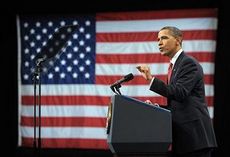 After months of deliberation, endless consultation and reams of paper, President Obama came to the same conclusion that he himself had reached only a few months ago, and that which his handpicked commander, General McChrystal, had arrived at more recently: the US-led intervention is just, right and demands more resources. As usual, Obama’s oratory was impressive – though without the personal anecdotes he normally works in. He rejected comparisons with Vietnam and evoked World War II with a reference to President Roosevelt. The West Point cadets added a kind of battle-evoking gravitas that Obama, who has never worn a uniform or been in war, often struggles to evoke.
After months of deliberation, endless consultation and reams of paper, President Obama came to the same conclusion that he himself had reached only a few months ago, and that which his handpicked commander, General McChrystal, had arrived at more recently: the US-led intervention is just, right and demands more resources. As usual, Obama’s oratory was impressive – though without the personal anecdotes he normally works in. He rejected comparisons with Vietnam and evoked World War II with a reference to President Roosevelt. The West Point cadets added a kind of battle-evoking gravitas that Obama, who has never worn a uniform or been in war, often struggles to evoke.
His new strategy seems to involve increasing civilian support, building up Afghan security forces, surging for 18 months and in 2011 begin transferring security responsibilities to local control.
The rest is, at best, a refinement of existing strategy. There will be no Bosnia-style High Representative. Even as it teeters on collapse, the US want to strengthen the UN in Kabul. Hamid Karzai is given the usual “tough love” message, but even White House officials understand that they must work with Karzai and take him at his word.
Vis-a-vis Pakistan, the US will probably try to help the Islamabad government develop Pakistan economically. There is talk of a focus on water, energy and infrastructure – not the usual items found in US appropriation bills for Pakistan. But that is what I thought the Kerry-Lugar Bill was about and what had kept Mr Insisible, Richard Holbrooke, busy? With President Zardari under renewed pressure from the army as well as his political opponents and India feeling squeezed between US backing for Pakistan and a growing China, the region looks set for more turmoil.
In laying out his old/new approach, President Obama may have done enough to placate both sides of the political aisle. That is important. If he cannot bring Democrats with him, this war will soon run out of funding and support. Relying on Republicans may also give voters the feeling that having one party in the White House and another controlling Congress is not a bad way to govern. But is this kind of triangulation enough to win wars? I hope so. If not, we will probably found out in a few months time – when another strategic review will be due, judging by the current pattern.






Comments